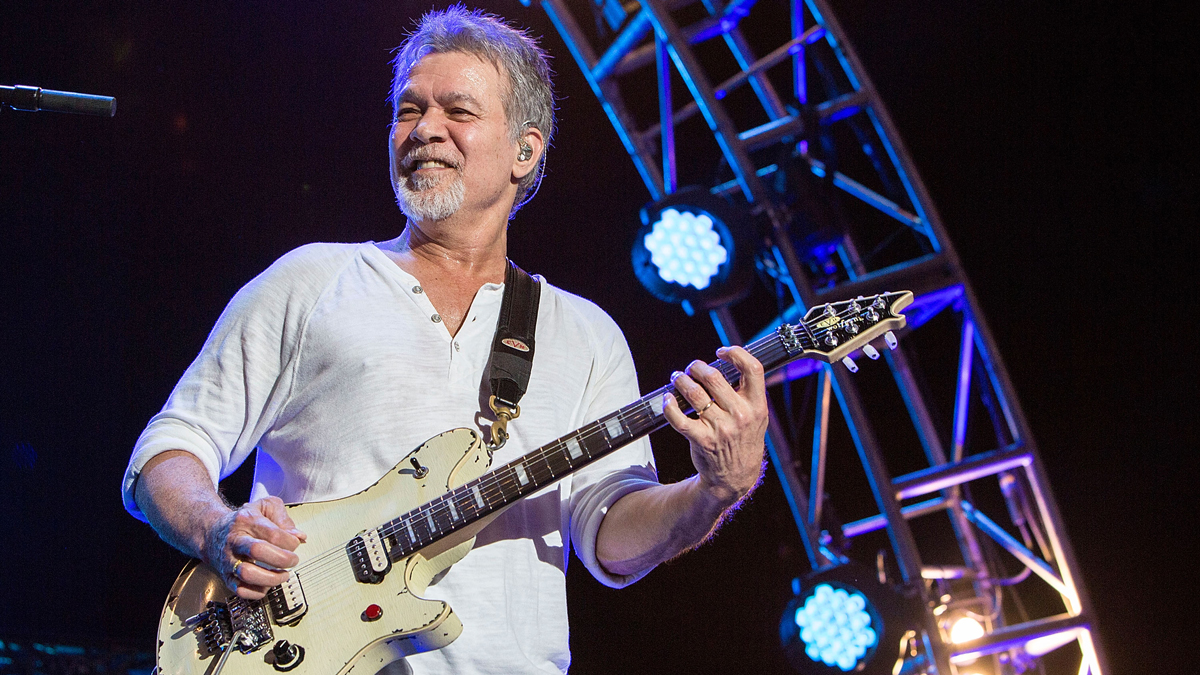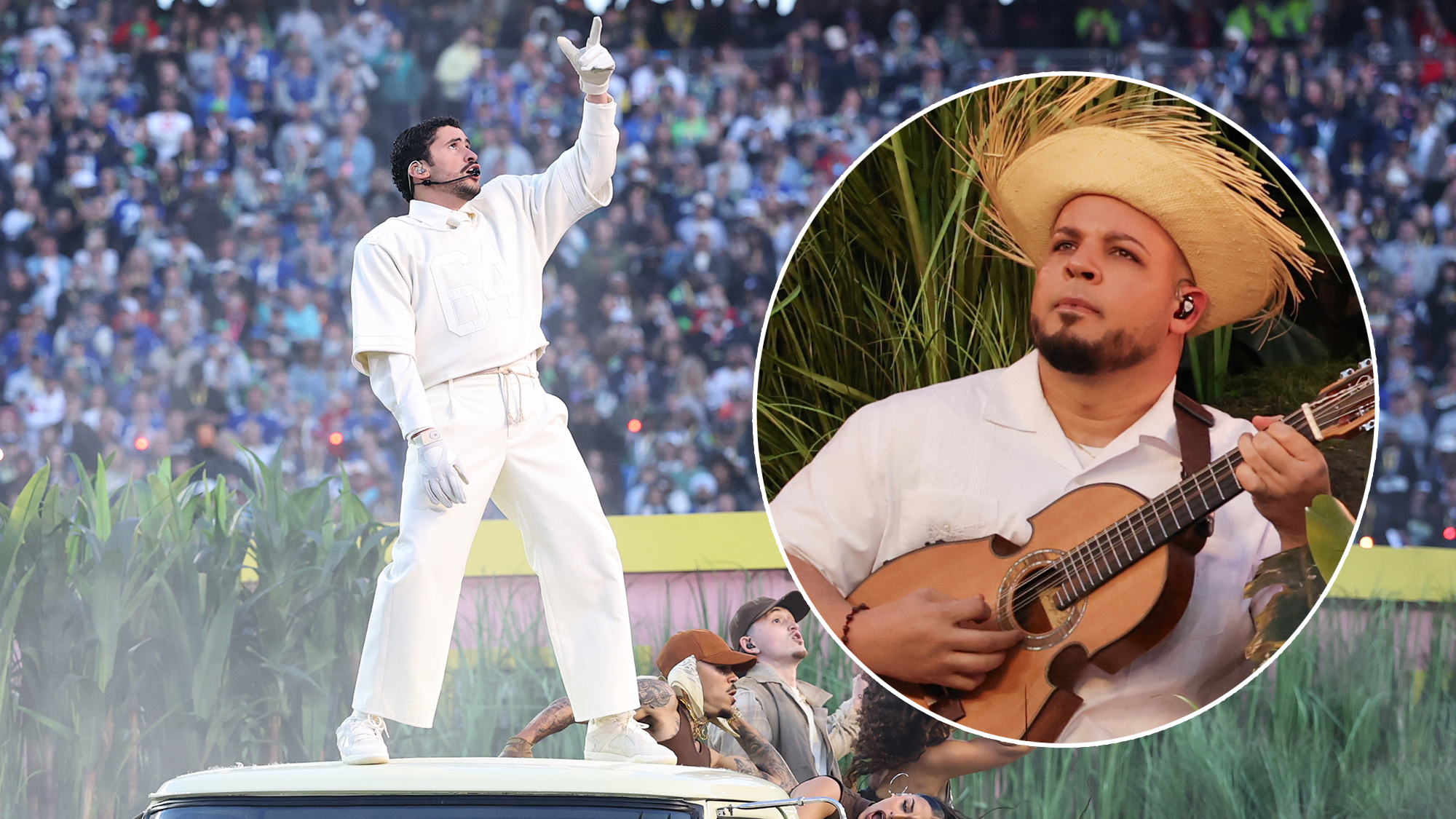Eddie Van Halen dies aged 65 following cancer battle
Wolfgang Van Halen confirms the passing of one of the greatest guitarists of all time

All the latest guitar news, interviews, lessons, reviews, deals and more, direct to your inbox!
You are now subscribed
Your newsletter sign-up was successful
Eddie Van Halen, trailblazing Van Halen guitarist and one of the greatest guitar players of all time, has died aged 65.
His son, Van Halen bassist Wolfgang Van Halen, confirmed the news on Twitter, with a statement that reads, "I can’t believe I’m having to write this, but my father, Edward Lodewijk Van Halen, has lost his long and arduous battle with cancer this morning.
"He was the best father I could ever ask for. Every moment I’ve shared with him on and off stage was a gift.
"My heart is broken and I don’t think I’ll ever fully recover from this loss.
"I love you so much, Pop."
Van Halen initially underwent treatment for throat cancer in 2000, before being declared cancer-free in 2002. Reports suggested the cancer had returned late last year.
Eddie Van Halen is widely regarded as one of the guitar's most groundbreaking players – he was recently voted No. 4 on Total Guitar's list of the greatest rock guitarists of all time – and changed the landscape for every player that followed with innovations in both playing style and gear.
All the latest guitar news, interviews, lessons, reviews, deals and more, direct to your inbox!
pic.twitter.com/kQqDV7pulROctober 6, 2020
Born in Amsterdam, the Netherlands on January 26 1955, Eddie Van Halen emigrated to Pasadena, California with his older brother, Alex Van Halen, in February 1962.
Van Halen’s musical career started out on piano, where his inability to read music would often lead to him improvising his way around pieces from Bach or Mozart. But it was hearing his brother Alex’s performance of The Surfari’s Wipe Out that led him to switch to electric guitar.
The brothers formed an early band called The Broken Combs while at Hamilton Elementary School in Pasadena, at which time Eddie was still in fourth grade, which inspired him to focus on developing a career in music.
The roots of Van Halen were established 1972 when Alex and Eddie Van Halen founded Genesis, later Mammoth, eventually changing the name to Van Halen in 1974 with the arrival of frontman David Lee Roth and bassist Michael Anthony. Prior to his joining, Eddie was handling both vocals and guitars, his six-string contributions heavily inspired by idols Eric Clapton and Jimi Hendrix.
“We played everywhere and anywhere, from backyard parties to places the size of your bathroom,” Eddie told Guitar Player in 1978.
“And we did it all without a manager, agent, or record company. We used to print up flyers announcing where we were going to play and stuff them into high school lockers. The first time we played we drew maybe 900 people, and the last time we played without a manager we drew 3,300 people.”
The band’s stellar live reputation earned them a recording contract with Warner Bros in 1977, which led to the creation and release of their landmark debut.
1978’s Van Halen went on to change the face of guitar playing to come, thanks to Eddie’s fiery and adventurous playing style, from the tight rhythmic riffs of Runnin’ With The Devil and Ain’t Talkin’ ’bout Love to incendiary instrumental, Eruption, whose two-hand tapping techniques ushered in a whole generation of shredders.
Recalling the creation of Eruption in 1996, Eddie told Guitar World, “While we were recording the album, I showed up at the studio early one day and started to warm up because I had a gig on the weekend and I wanted to practice my solo guitar spot. Our producer, Ted Templeman, happened to walk by and he asked, 'What’s that? Let’s put it on tape!'
“I played it two or three times for the record, and we kept the one that seemed to flow. Ted and Donn [Landee, engineer] liked it, and everyone else agreed that we should throw it on. I didn’t even play it right. There’s a mistake at the top end of it. Whenever I hear it, I always think, ‘Man, I could have played that better.’”
Eddie’s status as one of a new breed of guitar gods was cemented when Michael Jackson tapped him up to perform the iconic solo on global smash Beat It.
As well as his playing, Eddie’s gear innovations proved similarly influential, as he fused Stratocaster-style bodies with Gibson PAF humbuckers in his iconic striped “Frankenstein” model, which gave rise to a whole new trend of SuperStrat electric guitars in the ’80s.
“Nobody taught me how to do guitar work: I learned by trial and error,” he told Guitar Player. “I have messed up a lot of good guitars that way, but now I know what I'm doing, and I can do whatever I want to get them the way I want them. I hate store-bought, off-the-rack guitars. They don't do what I want them to do, which is kick ass and scream.”
Van Halen’s legendary ‘brown sound’ came courtesy of Marshall Super Lead 100-watt heads, run at lower voltages for a warmer, fatter overdriven tone. The sought-after tone was made available to the rest of the guitar world with the announcement of a signature amp, the Peavey 5150, in 1992, before it became part of the EVH Gear product line-up at its launch in 2007.
A string of successful albums with David Lee Roth followed Van Halen’s debut, including 1984, which showcased some of Eddie’s incandescent guitar playing yet with Hot For Teacher, and a surprise shift to a more synth-driven sound, courtesy of Jump.
“When I first played Jump for the band, nobody wanted to have anything to do with it,” he told Guitar World in 2014.
“Dave said that I was a guitar hero and I shouldn’t be playing keyboards. My response was if I want to play a tuba or Bavarian cheese whistle, I will do it.”
Tensions mounted within the band during touring of the album, leading to Roth’s departure and the arrival of new frontman Sammy Hagar in 1986.
Four albums followed with Hagar, with the band winning a Grammy Award for Best Hard Rock Performance with Vocal for the album For Unlawful Carnal Knowledge in 1992.
Hagar departed in 1996, after which followed a short-lived reunion with Roth and a single album fronted by Extreme’s Gary Cherone.
Van Halen reunited with Roth, and released what would prove to be their final album, A Different Kind of Truth, in 2012. The band toured in support of the album, concluding their final live dates in October 2015.
Van Halen’s legacy is impossible to overestimate. From rock to blues, metal and beyond, his seismic rhythm playing, virtuosic leads and gear innovations have impacted every electric guitar player who has followed, and ensure his legacy will live on forever.
There are few guitarists outside of his heroes, Clapton and Hendrix, who can match the degree of influence with which Eddie Van Halen has exerted on popular music.
“If you want to be a rock guitarist you have to enjoy what you are doing,” Eddie told Guitar Player in 1978. “You can’t pick up a guitar and say, ‘I want to be a rock star’ just because you want to be one. You have to enjoy playing guitar. If you don't enjoy it, then it’s useless.”

Mike has been Editor-in-Chief of GuitarWorld.com since 2019, and an offset fiend and recovering pedal addict for far longer. He has a master's degree in journalism from Cardiff University, and 15 years' experience writing and editing for guitar publications including MusicRadar, Total Guitar and Guitarist, as well as 20 years of recording and live experience in original and function bands. During his career, he has interviewed the likes of John Frusciante, Chris Cornell, Tom Morello, Matt Bellamy, Kirk Hammett, Jerry Cantrell, Joe Satriani, Tom DeLonge, Radiohead's Ed O'Brien, Polyphia, Tosin Abasi, Yvette Young and many more. His writing also appears in the The Cambridge Companion to the Electric Guitar. In his free time, you'll find him making progressive instrumental rock as Maebe.
